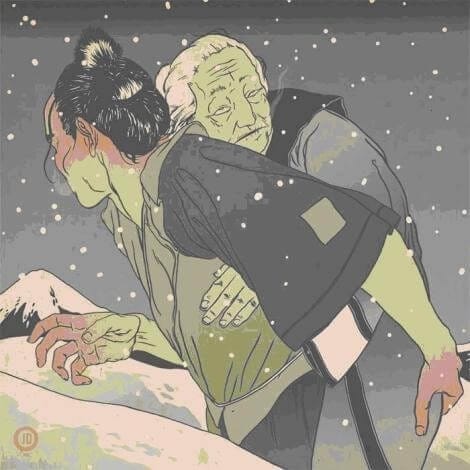What is “Ubasute”?
Uba is a Japanese word for the elderly woman while sute means to throw away or discard. “Ubasute” means “abandoning an old woman”.
It’s the practice in Japan where an elderly relative was taken up a mountain and left to die, either by dehydration, starvation, or exposure. It “is the subject of legend, but does not seem ever to have been a common custom”. The practice was most common during times of drought and famine and was sometimes mandated by feudal officials.
The elders were abandoned because, in the village where food was scarce, people who consumed precious food without laboring were considered burdens and useless, and redundant to the family and village life.
Ubasute has left its mark on Japanese folklore, where it forms the basis of many legends, poems, and koans. In one Buddhist allegory, a son carries his mother up a mountain on his back. . During the journey, she stretches out her arms, catching the twigs and scattering them in their wake, so that her son will be able to find the way home.
Ubasuteyama
Ubasuteyama is Sarashinayama in the olden time and at present, it is called Kamurikiyama. This is a mountain in Chikuma, Nagano Prefecture. It’s 547 meters high.
The story of Ubasuteyama has been used to enforce morals of taking care of the elderly and to be a dutiful son (or daughter). In one story, the dutiful son from a poor family took his aging mother to a mountain on a snowy day but decided to bring her home despite local customs of leaving aging mothers on a mountain to die alone. In the story, the local Daimyo heard of the incident and asked everyone to come up with an idea of taking care of their aging mothers.

The Legend of Ubasuteyama
A long time ago in a poor remote village, the elderly on their past sixty has to be taken to the mountain and be abandoned. A mother in her sixties said to her son ” My son, I’m already sixty. It’s time for me to be thrown away in the mountain”. Hearing what his mother said, there was bitterness on his face. It’s such great courage to take her to the mountain and desert her. ” I can’t be cruel to you, mother,” he said. ” The old woman next door and the old man next block were already taken to the mountain, so you have to take me also. It is a regulation in this village that old people had to be taken to the mountain.” Upon hearing that he was forced to do what was asked of him.
He carried his mother on his back, trudged through hills and valleys until he was deep in the mountain, far away from all human habitation. He brought her down under the shades of trees. At the moment of parting, the son was hesitant to leave his mother alone until the sun started to sink. “It will soon be dark, she said. “All the time you’ve been carrying me here. Hurry and get home safe”. Saying so, she bid him farewell, bowing with her palms together. Left alone in the mountain, the old mother had no means of returning home over fields and hills.
The son can hardly take a step away from his mother feeling so guilty of letting her die there. Not far from the place where he left her, it began to get darker and he lost his way. While looking for the way home, he stepped on twigs scattered on his way. He eventually thought that his mother dropped them one after another to serve as signs on his way home. There was so much pain in his heart after knowing that even in such a difficult situation and facing her death, his mother has not abandoned him even if he has abandoned her. The son hurried back to his mother, took her back home, and hid her in his barn.
Several days later
The lord ordered his villagers to make a rope out of ash.
The son told his mother “The lord ordered us to make a rope out of ash. We tried it but it’s impossible. If somebody can’t do it, we will have to pay more tribute to him.”
“My son. It’s a piece of cake. I’ll teach you.” The young man made a ring of straw rope, put it into salt water, dried it, and burned it as he was told to do. Then, he carefully brought it to the lord.
“You are a skillful man. It’s wonderful. I’ll give you a more difficult question.
This is a stick. You must tell me which end of this is the root and which end is the bough in a few days.”
He took the stick back to his house.
The young man was at a loss with the stick and asked his old mother for advice.
“It’s a very piece of cake. You only have to bring a basin full of water.”
The young man prepared the basin and put it into the water.
“Look! One end in the water is the root and the other end up the water is the bough.”
The young did the same thing in front of the lord and he was admired.
But the greedy lord did not give up to give a more difficult question.
“You’re a very clever man. I will give you the most difficult problem. You must make a drum that will make a sound without being beaten by a man.”
He came home pale with a drum and went to his mother for help.
“That’s very simple. You only have to get a few bees in the mountain.
The mother loosened the leather of the drum a little, put the bees into it, and fastened it again. The drum began to produce sound without being beaten.
The young man handed the sound drum to the lord.
“You are great, young man! Did you solve the three difficult problems by yourself?”
“My Lord, forgive me for cheating. The truth is… it’s not me but my old mother who solved them. I know that you gave an order to throw away the elderly in our village, but I couldn’t do such a cruel thing to the person who had loved me more than herself. After trying to leave her in the cold depth in the mountain, I found the twigs she dropped one after another to serve as my guide home and so I got back to her, brought her home, and hid her in my barn. She solved all the difficult problems you gave me. It is to say that the elderly know more things than the young, though they cannot work harder.”
The lord silently thought a second and said “Young man, you are right. I was wrong to misjudge the elderly. From now on no more taking the old in the mountain to die and instead, I want everybody to take good care of the old very well.”
A poem that commemorates the story:
“In the depths of the mountains,
Who was it for the aged mother snapped
One twig after another?
Heedless of herself
She did so
For the sake of her son”
Footnote
As a country with the longest average lifespan, and a culture of respect towards the elderly, there is no shortage of folktales that depict the elderly as main characters who teach morals and traditional Japanese values to the younger generations.
Takashi Hirohashi, a Japanese journalist claims that the increase of nuclear families and lack of the traditional Japanese religious value of honoring the ancestors have caused the Japanese society to become less connected.
A survey showed that while 61% of families plan to live with their elderly parents by taking on the responsibility as caretakers, more elderly prefer to be taken care of by professionals (private or institutions). Interestingly, the elderly male prefers to have their family member take care of them more than the elderly female.
“At present, deserting aging parents on a mountain is considered to be morally unacceptable. However, deserting them in their homes will equally bring the same outcome of dying alone on a mountain.”
Japan has a lot to offer to travelers when it comes to history and culture. U.S. citizens can visit this page and read about the Japan online visa for us citizens requirements before they go.
